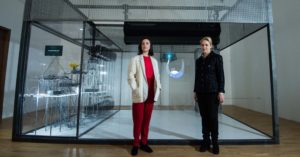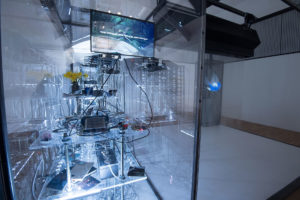999 years, 13 sqm (the future belongs to ghosts)
Whitechapel Gallery , London, UK
14 February – 12 May 2019
999 years, 13 sqm (the future belongs to ghosts).
The ‘living’ wall in the installation by Cecile B. Evans (artist) and Rachel Armstrong (Professor of Experimental Architecture), is a structure and organic battery system that is powered by microbes. The wall complex itself provides small amounts of electricity in the order of several volts, which power electronic displays in the installation. Composed of 25 bricks, which are organised into 5 parallel streams, each of 5 bricks in series, the complex is ‘fed’ once a week with organic matter. This tops up a continual gravity-fed supply of food for the ‘living’ bricks, at the same time that waste material is drained from the system. The maintenance process is something like feeding and cleaning a baby!
In the context of the “Is this Tomorrow?” exhibition, the MFC complex embodies an alternative technology for our living spaces that feeds upon liquid forms of domestic waste (e.g. grey water and urine) to produce useful amounts of energy and clean water. Responding to the challenge posed by the artist to transform the fragments of a building into something that would give them a new future, the traditional bricks in the installation were transformed into MFCs. Conferred with an inner ‘life’ and a bacterial ‘stomach’, these fundamental units of design become ‘living’. Just like other forms of life, the wall complex has the potential for transforming the space in the same way that living things evolve along with their habitats. A more complex technical exploration of these principles in the EU funded Living Architecture project[1] is being explored by this team, where the organic batteries are combined with other ‘living’ metabolic systems like photosynthesis, to create a complex metabolic technology. The aim is to invent a platform that may one day wean us off ‘dead’ fossil fuel based systems, by providing ‘living’ microbial systems in our homes and cities instead.
Bioengineering team:
Ioannis Ieropolous (lead; University of the West of England), Simone Ferracina (University of Edinburgh), Rolf Hughes (Newcastle University), Pierangelo Scravaglieri (Newcastle University), Jiseon You (University of the West of England), Arjuna Mendis (University of the West of England), Tom Hall (University of the West of England), Patrick Brinson (University of the West of England).
MFC Bioreactor Brick Installation Design: Pierangelo Scravaglieri, under the guidance of Ioannis Ieropolous
[1] This project is funded by the Horizon 2020 Research and Innovation Programme under EU Grant Agreement no. 686585, it brings together experts from the universities of Newcastle, UK; the West of England (UWE Bristol); Trento, Italy; the Spanish National Research Council in Madrid; LIQUIFER Systems Group, Vienna, Austria; and Explora, Venice, Italy.


